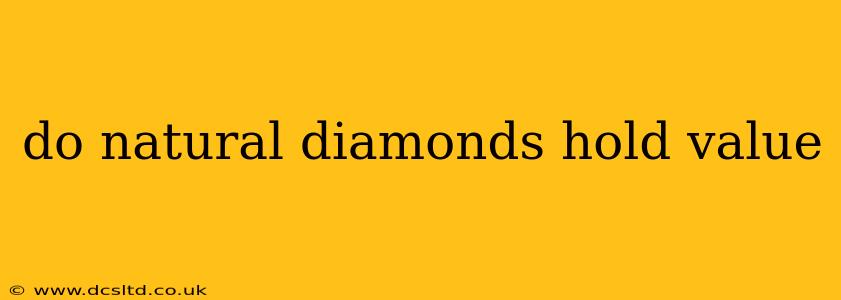Natural diamonds have long been prized for their beauty, rarity, and enduring value. But do they always hold their value? The answer is nuanced and depends on several crucial factors. While diamonds are generally considered a good investment, their value isn't guaranteed and fluctuates based on market trends and the specific characteristics of the stone. This comprehensive guide will explore the factors influencing diamond value and answer common questions surrounding their investment potential.
What Factors Influence the Value of a Natural Diamond?
Several key factors determine a natural diamond's value. Understanding these is crucial for anyone considering purchasing a diamond as an investment or heirloom. The "4Cs" – Cut, Clarity, Carat, and Color – are paramount, but other aspects also play a significant role.
-
The 4Cs: These are the cornerstone of diamond grading.
- Cut: Refers to how well a diamond's facets interact with light, influencing its brilliance, fire, and scintillation. An excellent cut maximizes a diamond's beauty.
- Clarity: Indicates the presence of inclusions (internal flaws) and blemishes (external flaws). Fewer imperfections mean higher clarity and value.
- Carat: Represents the diamond's weight, with one carat equaling 200 milligrams. Larger diamonds, all else being equal, command higher prices.
- Color: Diamonds range from colorless (D) to lightly colored (Z). Colorless diamonds are generally more valuable.
-
Certification: A reputable grading report from a trusted laboratory like GIA (Gemological Institute of America) or AGS (American Gem Society) significantly impacts value. These reports provide objective assessments of the 4Cs, increasing buyer confidence and transparency.
-
Shape and Style: The diamond's shape (round, princess, emerald, etc.) and style (e.g., solitaire, halo setting) also affect its value. Certain shapes are more popular and command higher prices.
-
Market Demand: Like any commodity, diamond prices are influenced by market trends. Economic conditions, consumer demand, and even geopolitical events can cause fluctuations in value.
Do Natural Diamonds Appreciate in Value?
While many believe diamonds are a surefire investment that always appreciates, this isn't entirely true. While some diamonds can appreciate in value over time, particularly high-quality, rare stones, others may hold steady or even depreciate. This depends heavily on the factors mentioned above and the overall market conditions. It's more accurate to say that some diamonds can be good investments, rather than all of them.
Can I Sell a Natural Diamond for What I Paid for It?
This depends largely on the factors outlined earlier. If you purchased a diamond with a strong certification, excellent 4Cs, and a popular shape and style, you have a better chance of recovering your initial investment or even making a profit. However, it's crucial to remember that resale often involves fees and commissions. Reselling a diamond usually means accepting a price lower than the original purchase price. You'll likely receive a price closer to the wholesale value rather than the retail price.
How Long Does It Take for a Natural Diamond to Appreciate?
There's no set timeframe for diamond appreciation. It can take years, even decades, for a diamond to significantly increase in value, and it's not guaranteed. The appreciation potential depends on factors like the quality of the diamond, market trends, and the overall economic climate. Therefore, viewing diamonds primarily as an investment rather than a luxury item should be approached cautiously.
What Are the Risks of Investing in Natural Diamonds?
Investing in diamonds carries inherent risks. Market fluctuations, economic downturns, and the difficulty in quickly liquidating assets are potential drawbacks. Unlike stocks or bonds, diamonds are illiquid assets, meaning they can't be easily sold for cash. Furthermore, accurately assessing a diamond's value independently can be challenging without professional appraisal.
Conclusion
Natural diamonds can hold their value and even appreciate under the right circumstances. However, it's essential to remember that they are not a guaranteed investment. Careful consideration of the 4Cs, certification, market trends, and the inherent risks is crucial before purchasing a diamond with the expectation of substantial future appreciation. If you're considering diamonds as an investment, consulting with a qualified gemologist and financial advisor is highly recommended.
